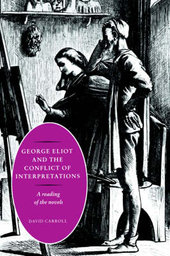
|
George Eliot and the Conflict of Interpretations: A Reading of the Novels
Hardback
Main Details
| Title |
George Eliot and the Conflict of Interpretations: A Reading of the Novels
|
| Authors and Contributors |
By (author) David Carroll
|
| Physical Properties |
| Format:Hardback | | Pages:348 | | Dimensions(mm): Height 236,Width 161 |
|
| Category/Genre | Literary studies - c 1800 to c 1900
Literary studies - fiction, novelists and prose writers |
|---|
| ISBN/Barcode |
9780521403665
|
| Classifications | Dewey:823.8 |
|---|
| Audience | | Professional & Vocational | | Tertiary Education (US: College) | |
|---|
|
Publishing Details |
| Publisher |
Cambridge University Press
|
| Imprint |
Cambridge University Press
|
| Publication Date |
11 June 1992 |
| Publication Country |
United Kingdom
|
Description
Two versions of George Eliot, both influential, have emerged from the study of her life and work. One is the radical Victorian thinker, formidably learned in a whole range of intellectual disciplines; the other is the reclusive novelist, celebrating through her fiction the communal values which were being eroded in the modern world. This chronological study of the novels brings the two together and places her within the crisis of belief and value acted out in the mid-nineteenth century. George Eliot saw this crisis as one of interpretation, in a vivid, almost apocalyptic awareness that traditional modes of interpreting the world were breaking down irrevocably. This study shows how, in response, she redefined the nature of Victorian fiction, testing to the point of destruction a variety of Victorian myths, orthodoxies, and ideologies in each of her novels.
Reviews'Meticulously researched and cogently argued, George Eliot and the Conflict of Interpretations is not only the most sophisticated reading of and arguably the best introduction to George Eliot's novels to date, but also one of the most distinguished recent contributions to the intellectual history of the Victorian period. Carroll's wide-ranging book will be essential reading not only for all students of Eliot's novels, but for the growing number of cultural historians concerned with the interplay of intellectual contexts and literature in the nineteenth century.' Anglia
|